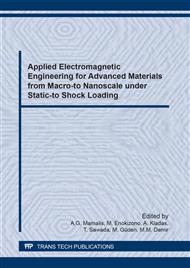p.83
p.93
p.98
p.104
p.110
p.116
p.121
p.129
p.135
A Study on the Solvent Vapor Induced Film Formation of PS/AgNPs Composites
Abstract:
In this study, pyrene (P) tagged polystyrene (PS) latex dispersions and silver nanoparticles (AgNPs) were mixed at various weight fractions in the range between 0 and 50 wt%. The prepared mixtures were dropped on the glass substrates by considering drop casting method and were dried at the room temperature. The resultant powder films were then exposed to solvent vapor to monitor how film formation and morphological behaviors of PS/AgNPs composites are altered. Film formation behavior of composites was assessed via fast transient fluorescence (FTRF) which measures the fluorescence lifetimes of P from its decay traces during vapor exposure process. It was observed that pyrene lifetimes decreased as vapor exposure time, t increased. A Stern–Volmer kinetic analysis was used for low quenching efficiencies to interpret the decrease in pyrene lifetimes. UV-Vis (UVV) technique was employed to monitor optical transparency of the films. In the range of 0-20 wt% of AgNPs content, smooth and transparent films were obtained. However, above this range, the films were seen that they have low transparency and poor film formation since the increment in AgNPs content was lead to aggregations. The Prager–Tirrel model was employed to the FTRF data to obtain back-and-forth frequencies, ν, of the reptating PS chains during vapor induced film formation process. SEM images of the samples were taken after film formation process is completed and were found to be consistent with optical and fluorescence quenching data.
Info:
Periodical:
Pages:
110-115
DOI:
Citation:
Online since:
March 2018
Authors:
Price:
Сopyright:
© 2018 Trans Tech Publications Ltd. All Rights Reserved
Share:
Citation:


